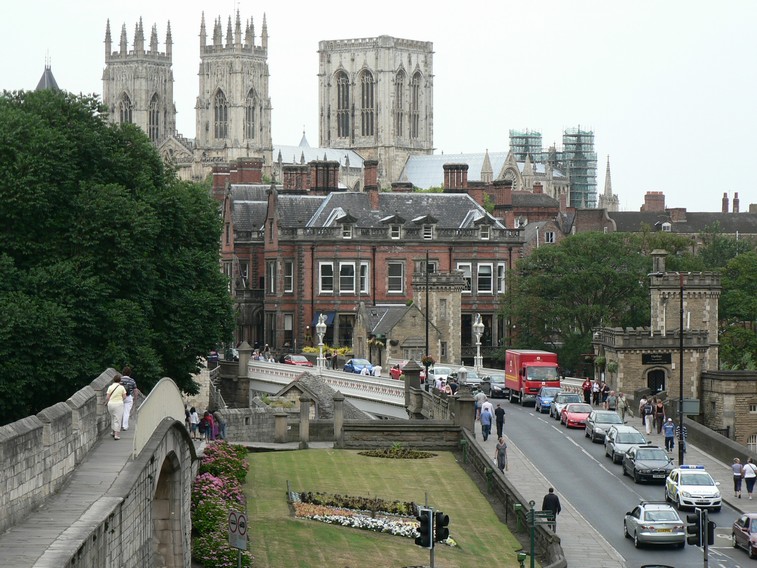Known more for its history than digital creativity, York has spent the last decade quietly reinventing itself as a city ready for the super-connected digital future. Is it now positioned to be the UK’s next tech startup success story?
Having existed for almost two millennia, York is better known for its rich history than as a centre for digital creativity.
But beneath York’s cobbled streets lies more than just the bones of Viking villagers and Roman centurions. There’s something else: a high speed fibre optic data network, announced this week, promising gigabit speeds to homes and businesses that would give York the fastest broadband in Britain.
And within York’s ancient city walls, the city is blanketed by free WiFi, thanks to discreetly installed antennas. It’s also available on buses, in parks and public buildings.
Thanks to a share of £50 million from the Government’s SuperConnected City programme, these major public investments by the City of York council have helped position York as a surprisngly forward-thinking city. By providing digital infrastructure, just like electricity or running water, York has created an environment where digital businesses don’t have to struggle to start up.
James Alexander, the leader of the City of York council, is adamant that digital infrastructure is the key to the city’s future success.
“We want to be a top five UK economy and to do so, we need the physical infrastructure to support that,” he said. “Turning York into a ‘Gigabit City’ is hugely important for businesses, residents and visitors.”
But it’s not just connectivity and infrastructure.
Beyond the narrow streets of the centre, there have been active developments outside the city walls that have promoted hi-tech industries. York is a founding National Science City and, between 1998 and 2008, it is claimed gained 80 new tech companies and 2,800 jobs. York Science Park and other business parks on the outskirts have provided room for these fast-growing firms to expand.
Companies taking advantage of this digital boom include Bytemark Hosting. Founded by Matthew Bloch and Peter Taphouse in 2002, Bytemark hosts domains including Carling.com, the Cabinet Office and the Royal Institution.
Last year, it invested £1.2million in its first wholly-owned datacentre in York, at the York Business Park just north of the city. Its expansion was helped by the availability of office space suitable for hi-tech firms and easy access to power.
Managing director Matthew Bloch explains why this was an important step for the business. “Bytemark has been in business for over 10 years and in that time we’ve had to rent space in premium facilities in Manchester and London.”
“Now we can put our money where our heart is, and invest in our home town. Being completely in control of our own infrastructure means we can confidently stand behind every single aspect of our service. This benefits our existing global customers, but especially those in Yorkshire who can come and see exactly what they’re getting.”
As Bytemark has grown, it’s benefited from the availability of highly-skilled local talent. The University of York has a world-leading computer science department with many graduates staying on to work in local businesses, including Bytemark.
“In the last 12 months we’ve grown staff numbers by 30%,” said operations director Taphouse. “I’ve found it easy to fill roles locally which has helped keep recruitment costs down.”
Bytemark is just one of the many digital businesses growing and investing in the city.
Revolution Software, creators of the hugely popular Broken Sword series that earned them over £60million, has seen new growth following investment in mobile platforms for its games. Isotoma, a creative technology consultancy, has also seen success with new clients including Arcadia Group.
And now, a new initiative by two York web developers is looking to put York firmly on the map as a centre for digital creativity.
“DotYork” is the first major digital conference to be held in the City of York and will bring some of the UK’s top speakers in web design to the region. Rick Chadwick and Jonic Lindley are two freelance developers who intend to bring the city’s digital community together for a “day of inspiration” on 1 May.
“York is well known for its history, but it’s not exactly known for its digital industry,” said Chadwick. “We set up DotYork to try to change that. The conference is just the start of what we have planned.”
So while York retains its history, scratching beneath the surface reveals more than just old bones. The digital infrastructure is in the ground. The location is right with space for growth. And the community is growing, aided by local talent.
All these things are strong indicators that York is a strong contender to be the UK’s next digital success story. If so, it would be a fitting new chapter for one of Britain’s most ancient settlements.












